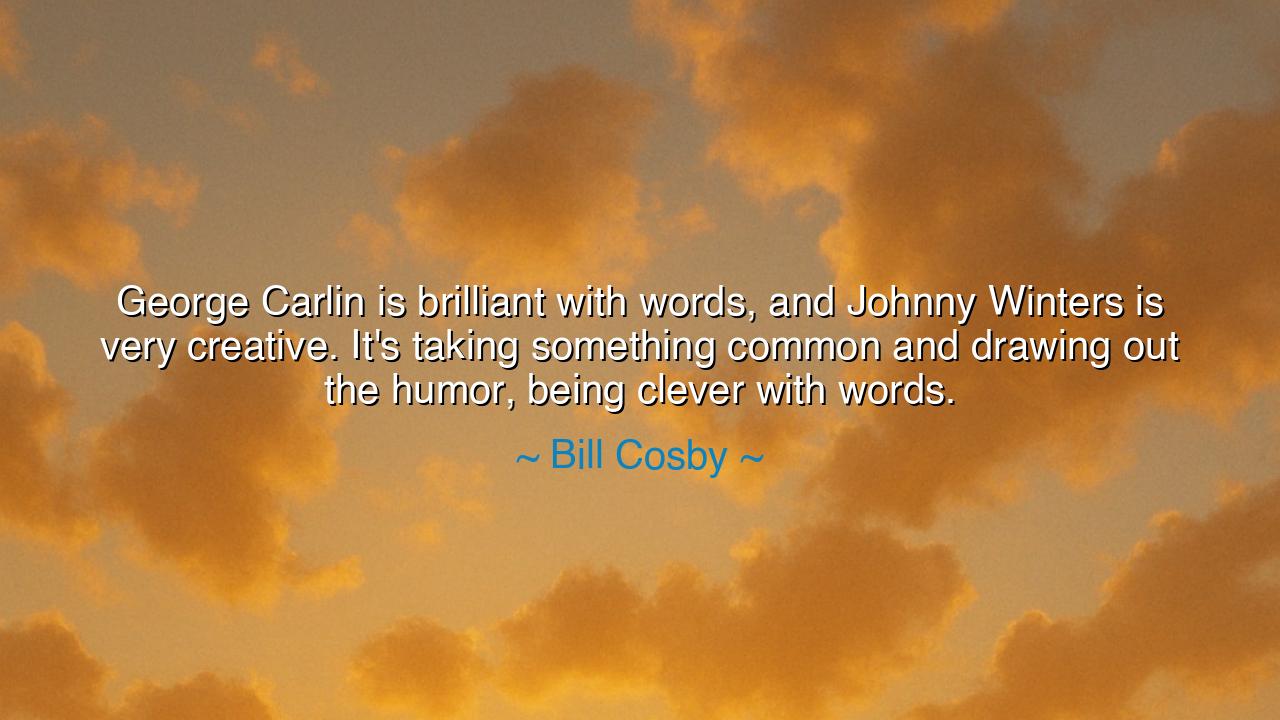
George Carlin is brilliant with words, and Johnny Winters is very
George Carlin is brilliant with words, and Johnny Winters is very creative. It's taking something common and drawing out the humor, being clever with words.






In the words of Bill Cosby, we find both reverence and revelation: “George Carlin is brilliant with words, and Johnny Winters is very creative. It’s taking something common and drawing out the humor, being clever with words.” These words speak not merely of comedy, but of perception—of the rare power to see beyond the veil of the ordinary and uncover the beauty, irony, and truth hidden within it. In this reflection, Cosby pays homage to the alchemists of language—those who can turn the base metal of everyday life into the gold of laughter and insight.
The ancients taught that wisdom lies not in discovering what is new, but in seeing the familiar anew. To the untrained eye, a moment is just a moment, a word merely sound—but to the wise, every common thing holds a spark of wonder. This is the essence of what Cosby admired in Carlin and Winters. George Carlin, the philosopher disguised as a jester, wielded language as both mirror and sword—reflecting the absurdity of the world while cutting through its hypocrisy. His brilliance with words lay not in complexity, but in clarity. He could take the most mundane of things—airports, traffic, or the way people speak—and reveal in them the grand comedy of human existence.
Johnny Winters, too, possessed this creative fire. His mind was a forge of imagination, turning thought into laughter as effortlessly as breathing. He was not merely funny; he was creative, conjuring humor from thin air, weaving worlds where absurdity danced with meaning. Together, these two artists embodied a truth that the ancients would have called divine: that laughter, when born from insight, is sacred. For laughter, in its highest form, is the sound of recognition—the soul remembering itself through the rhythm of words.
Let us look, then, to the story of the philosopher Socrates, who often cloaked his wisdom in irony. He would ask questions so simple that they seemed foolish, yet in answering them, his listeners uncovered profound truths. Like Carlin and Winters, he too took the common and transformed it into revelation. When he asked, “What is virtue?” or “What is wisdom?” he was not teaching doctrine—he was awakening perception. The laughter he evoked from those who misunderstood him was the same laughter that later turned into awe when they finally understood. Thus, humor, when wielded by the wise, is not mockery—it is illumination.
Cosby’s praise, then, is not simply for artistry, but for mastery—the ability to be clever with words not for vanity, but for truth. To draw out humor from the common is to see deeply into life, to understand its contradictions and to make peace with them. It is the art of revealing the universal through the particular. This gift does not belong only to the comedian; it belongs to all who seek to understand the world. The scientist who perceives wonder in a drop of water, the poet who finds eternity in a fleeting glance, the teacher who turns confusion into clarity—all share in this sacred craft of transformation.
From this truth arises a timeless lesson: do not look for greatness in what is grand. Seek it in what is small. Learn to see, truly see, what lies before you. When you walk through your days, do not let the ordinary dull your mind. Ask yourself, “What truth hides here? What humor hums beneath this silence?” Practice the art of turning the everyday into insight. Be clever with your words, yes—but more importantly, be clever with your seeing. For words are but vessels, and it is the vision behind them that makes them powerful.
And so, to those who would walk the path of creativity, take this teaching to heart: to find humor in the common is to touch the soul of humanity. It is to remind others—and yourself—that life, though brief and fragile, is filled with wonder. Speak not to impress, but to awaken. Laugh not to escape, but to understand. For when your words draw laughter from truth and beauty from simplicity, you become not merely a speaker, but a seer—one who, like George Carlin and Johnny Winters, turns the ordinary breath of life into eternal meaning.






AAdministratorAdministrator
Welcome, honored guests. Please leave a comment, we will respond soon